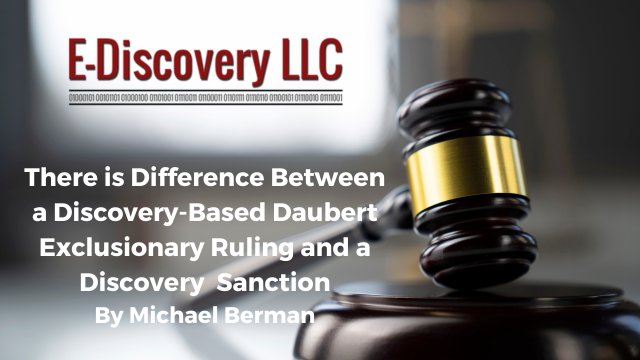
[EDRM Editor’s Note: The opinions and positions are those of Michael Berman.]
Generally, when a fact witness changes their sworn testimony, the new version is admissible and the prior version is used to impeach it. In Asokere v. Waldrop, 2024 WL 1651658 (Apls. Ct. Md. Apr. 17, 2024)(unreported), two experts changed their sworn testimony in a Daubert hearing. Their testimony was excluded under Daubert and, without causation experts, summary judgment was entered.
The trial court stated that if “counsel cannot take the deposition of an expert with the full expectation that they are determining … what opinions [the expert] will render at trial, and the basis for the opinions at trial” then ‘we’re turning the purpose of discovery on its head.’”
That would seem to be, in part, a discovery-based ruling. However, although the decision was based on depositions, it was not a discovery sanction.
The unreported decision addresses the interplay between: deposition testimony; a Daubert decision based on changed expert testimony; and, a subsequent grant of summary judgment.
Plaintiffs, parents of an infant, sued health care providers alleging that medical malpractice caused a serious and permanent birth injury. Two of plaintiffs’ expert witnesses offered causation testimony during a Daubert hearing. That testimony differed from their earlier deposition testimony.
The intermediate appellate court affirmed the summary judgment, writing:
Ultimately, the court excluded both experts because it determined the basis for their opinion had changed between the deposition and the Daubert hearing. Under the circumstances of this case, we discern no abuse of discretion in the court’s holding. In so deciding, the court had evidence before it which supported the conclusion that Drs. Adler and Luciani had changed the basis for their opinions after reviewing out-of-state opinions in which two federal judges had found their testimony relying on the previous basis inadmissible.
Asokere v. Waldrop, 2024 WL 1651658, at *12 (Apls. Ct. Md. Apr. 17, 2024)(unreported).
The Court added:
Although the [trial] court was also concerned with the potential prejudicial effect of the altered expert opinions,1 it specifically acted to preclude the experts pursuant to Daubert-Rochkind and Rule 5-702, as opposed to imposing a discovery sanction. Because we conclude that the circuit court did not abuse its discretion in precluding the experts pursuant to [Daubert] Rule 5-702, we need not reach Appellants’ contention that precluding the opinions of Drs. Adler and Luciani was an inappropriate discovery sanction. [emphasis added].
Asokere v. Waldrop, 2024 WL 1651658, at *12 (Apls. Ct. Md. Apr. 17, 2024)(unreported).
On appeal, plaintiffs asserted, in part, that the deposition testimony was admissible. Plaintiffs also argued, again in part, “that even if the Daubert testimony amounted to a discovery violation, total preclusion of that testimony resulting in summary judgment was an excessive discovery sanction.”
However, in excluding testimony, the trial court expressly stated “that it was exercising its gatekeeping function under Daubert” and “also noted that in so doing, it was not imposing a sanction pursuant to the violation of a discovery order and that it ‘view[ed] this as more than a discovery violation.’” [emphasis in original].
On the merits of the Daubert ruling, the Appeals Court held that the fact that the experts changed the stated basis for their opinions in the Daubert hearing “can properly be considered indicative of an unreliable methodology….”
The Appeals Court held that the fact that the experts changed the stated basis for their opinions in the Daubert hearing “can properly be considered indicative of an unreliable methodology….”
Michael Berman discussing Asokere v. Waldrop, 2024 WL 1651658 (Apls. Ct. Md. Apr. 17, 2024)(unreported).
The Appeals Court wrote: “The appeal before us arises from the circuit court’s ruling to preclude Drs. Adler and Luciani from testifying due to the differences between their deposition testimony and their statements during the Daubert hearing.” It added that experts are permitted, “to at least some degree,” clarify or provide additional or more specific support in a Daubert hearing.
However, where an expert draws conclusions prematurely, based on incomplete data, or in a single-minded effort to achieve a particular result, and later attempts to “shore up” an unreliable opinion with additional facts, a court could certainly determine that such an approach militates against the reliability of the expert’s methodology.
Asokere v. Waldrop, 2024 WL 1651658, at *10 (Apls. Ct. Md. Apr. 17, 2024)(unreported).
Because this was not a discovery issue, use of the prior sworn statements for impeachment was not the proper resolution.2
Notes
1 Presumably, that was a concern based on discovery principles.
2 An unreported opinion may not be cited as precedent within the rule of stare decisis. It may be cited for its persuasive value only if the citation conforms to Md. Rule 1-104(a)(2)(B).


